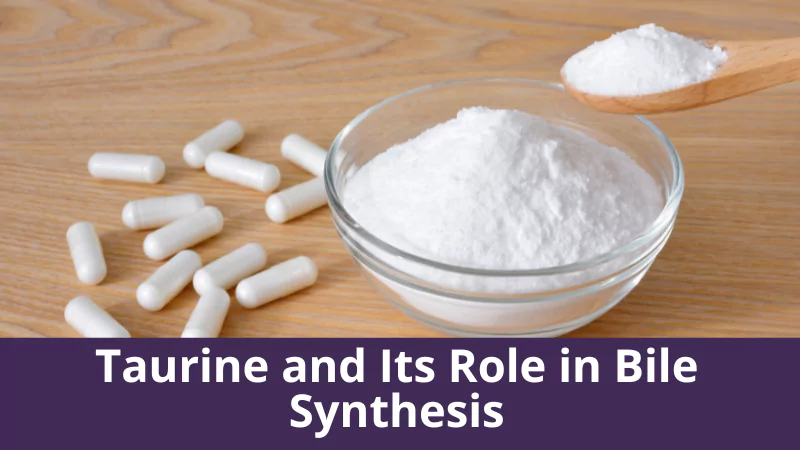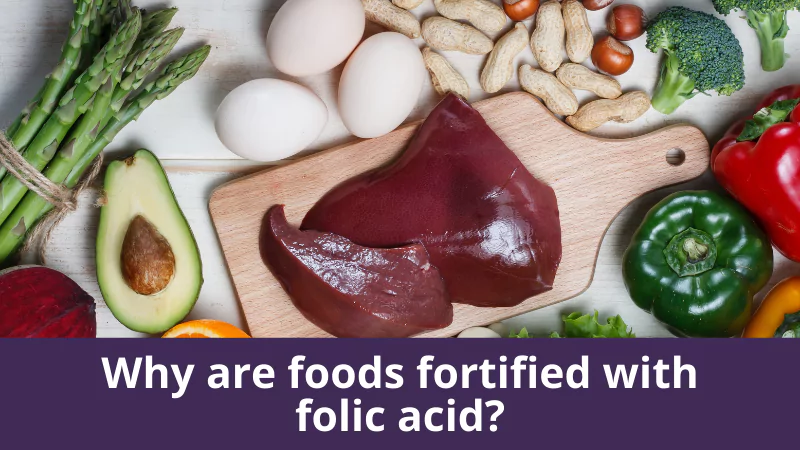Taurine and Its Role in Bile Synthesis
Bile, which consists mainly of bile acids and bile salts, aids digestion in the small intestine. Bile and its constituents are produced by the liver and stored in the gall bladder. Bile acids and bile salts, however, are synthesized in the liver via specific biochemical reactions for bile to be formed as a final product. Several bile salts are formed by the conjugation of taurine with bile acids in the liver, as taurine provides a substrate for bile salts. Therefore, taurine is paramount in the process of the formation of bile salts, and ultimately, bile. Furthermore, bile acids, which function to digest lipids, are conjugated with taurine – increasing membrane mobility and fluidity of hepatocytes. It is also important to consider which foods help to increase taurine concentrations and thus assist bile production and synthesis.
Taurine provides a substrate for bile salts
Taurine, an amino acid that affects hepatocytes, is involved in forming bile salts from bile acids through conjugation i.e binding. Taurine is therefore responsible for providing a substrate for bile salts. In addition, large amounts of bile salts are reabsorbed in the gut and recycled for further bile production. Since sodium is involved in bile salt synthesis and reabsorption, it is clear that bile salts and bile acids are regularly and rapidly converted to maintain bile production.
Further, since there is an apparent link between bile salts and bile acids, and there exists a conjugation of bile acids with taurine, there is proof that taurine is necessary for the conversion between bile salts and bile acids – along with conjugation of bile acids and continued circulation of bile and its derivatives, such as in enterohepatic circulation.
Bile acids and conjugation with taurine
As bile acids are conjugated with taurine in the liver, there are several modifications that occur in hepatocytes that are vital to ensure the liver remains in a healthy state. For instance, membrane mobility, and overall fluidity of hepatocytes, increase in the presence of bile acids conjugated with taurine. Therefore, bile acids are frequently found conjugated with taurine – enabling advanced hepatocyte efficiency. Bile acid conjugation with taurine or glycine is catalyzed by two biochemical reactions:
- The enzyme cholyl-CoA synthetase catalyzes bile acid into acyl-CoA thioester
- Bile acid moiety is transferred from acyl-CoA thioester to taurine or glycine, forming N-acyl bile acid conjugate by bile acid-CoA:amino acid N-acyltransferase
According to studies, taurine also functions to increase bile flow, bile acid pool size and rate of excretion of bile acids, while reducing the secretion rate of cholesterol in bile.
Foods to improve taurine levels
Taurine, which is synthesized by combination of cysteine and methionine, is important in ensuring liver health, proper digestion and efficient metabolic processes within our bodies. It is therefore necessary to include foods rich in taurine in our diets. Anxiety, autism, hypertension, gout, infertility and obesity may be conditions of low taurine levels. Foods that contain adequate levels of taurine include animal meat, fish and sea algae.
- Meat. Animal meat is relatively rich in taurine, ranging from larger animals to smaller birds and insects. Beef liver, for example, contains approximately 2.4g of taurine per kilogram.
- Fish. Fish are another source of food that contain high levels of taurine, including other marine animals – such as several crustacean species. According to the university of California Davis, mackerel contain around 9.3g of taurine per kilogram.
- Algae. Studies have shown that some aquatic plants and algae contain considerable levels of taurine, contrary to terrestrial plants.
Human breast milk also contains high concentrations of taurine, providing infants with sufficient daily amounts of taurine they require.
Taurine supplementation is another option that can be considered if you are severely deficient in taurine. Increased levels of dietary taurine ultimately aid in bile production.
Summary
Bile is an essential product of our bodies that is involved in metabolism and digestion, consisting of two important components: bile acids and bile salts. These words are often used interchangeably, but differ drastically in their biochemical functioning and processes. Bile salts, which are derived from bile acids and sodium. Taurine provides a substrate for bile salts, through bile acid conjugation with taurine. As such, bile salt and bile acid conversion regulates bile production.
Bile acid conjugation with taurine in the liver results in cellular modifications, such as membrane mobility and fluidity, causing an increase in bile flow and pool size. High dietary taurine intake is therefore essential, and can be found in meat, fish and algae.
References
Goswami, S. K., & Frey, C. F. (1977). A method for the separation of glycine-conjugated bile acids as a group from taurine-conjugated bile acids. Biochemical Medicine, 17(1), 20-23. doi:10.1016/0006-2944(77)90005-9
http://www.livestrong.com/article/209567-what-is-bile-salt/
http://www.tuscany-diet.net/2016/08/14/bile-salts-definition-function-synthesis/
http://www.livestrong.com/article/157099-what-foods-contain-taurine/
https://bodyecology.com/articles/deficient_in_taurine.php
Salvioli, G., & Salati, R. (1979). Faecal bile acid loss and bile acid pool size during short-term treatment with ursodeoxycholic and chenodeoxycholic acid in patients with radiolucent gallstones. Gut, 20(8), 698-704. doi:10.1136/gut.20.8.698









